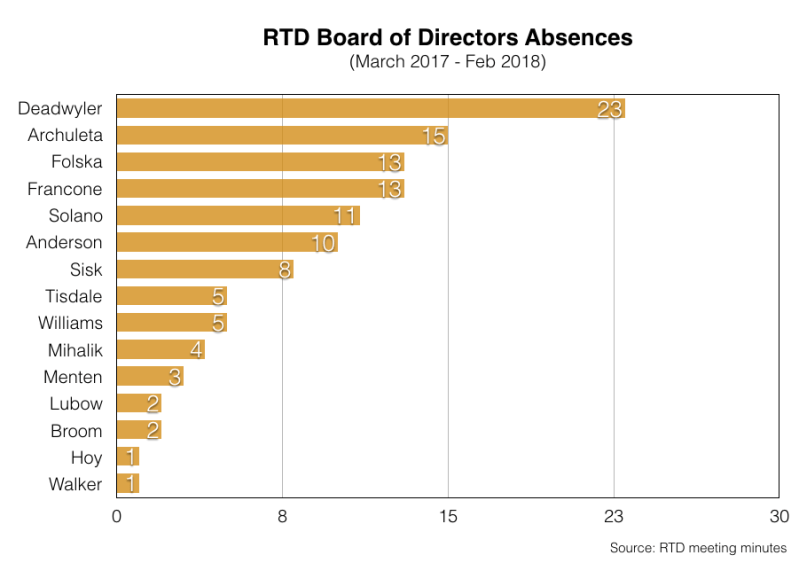Is Your RTD Board Member Slacking?

Denver’s Regional Transportation District is pretty unusual in one respect: Unlike most other transit agencies, RTD’s Board of Directors is elected. Voters in 15 districts decide who represents them on the board and makes decisions about service, fares, and even development (or lack thereof) around rail stations.
It turns out that some of those reps take their elected duties a lot more seriously than others.
I recently reviewed meeting minutes from March 2017 through February of this year to see who puts in the time to represent their constituents, and there’s more variation that you might expect. You can see which district you live in on this map.
District B Director Barbara Deadwyler, who is also the Board’s second vice chair, missed 23 meetings, for an absentee rate of about 31 percent. Yet she represents important neighborhoods for transit like Five Points, Curtis Park, Park Hill, Montbello, and Stapleton.
District C Director Bonnie “Ernest” Archuleta missed 15 meetings over the same period, or about a quarter. He also represents central, urban areas where transit is key and needs to improve, including Lower Downtown, River North, and a host of neighborhoods on the north and west sides.
The tally accounts for board meetings and committee meetings, where formal votes are often taken, as well as “study sessions” where directors learn about topics with policy implications. (Multiple committees often meet on one night, and not all members have the same committee duties.) Officials get credit for attending if they call in, which is common.
Most directors, several in less transit-dependent parts of the region, managed to miss significantly fewer meetings. Directors Jeff Walker (District D) and Larry Hoy (District J) each missed just one.
The RTD Board flies under the radar compared to other local political offices — you won’t see reporters at every meeting like the City Council. It’s also more of a part-time gig, with about 60 meetings per year and annual compensation of $12,000.
But transit policy should have a higher profile. Just like any political office, the more people pay attention and hold their RTD reps accountable, the harder their reps will have to work for them.
By the way, 16 candidates are running in November for six seats in districts B, C, J, K, L, and O [PDF].


